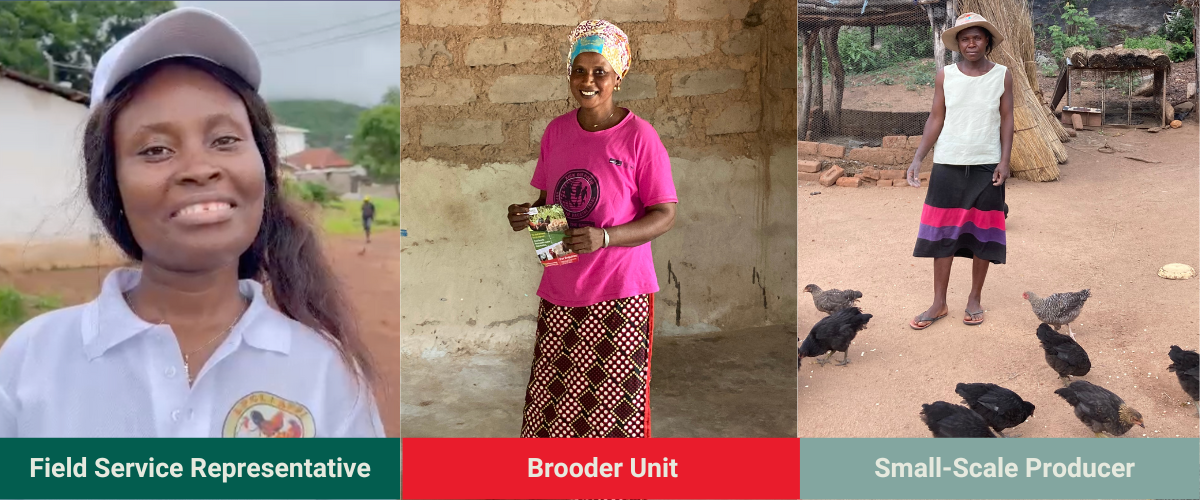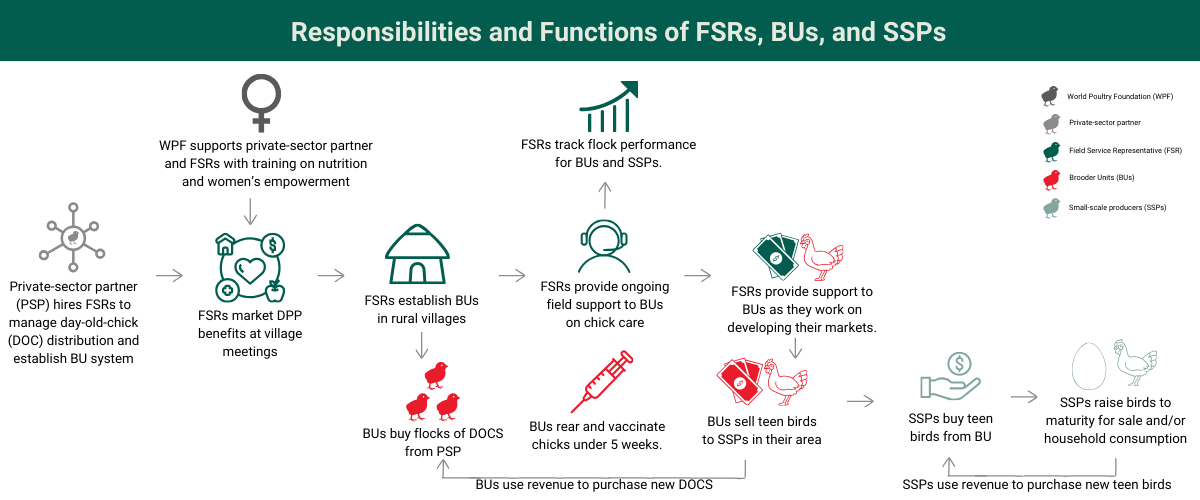By: Eve Kamba, Maureen Stickel and, Jan de Jonge
If you’ve been following the African Poultry Multiplication Initiative (APMI) Blog series, you’ve walked through the intricacies of private sector partner selection, the complex planning stages, and the establishment of a robust supply chain. Now, our focus shifts to the crucial players on the ground who make up the supply chain and ensure profitability for every individual involved. These key players include Field Service Representatives (FSRs), Brooder Units (BUs), and Small-Scale Producers (SSPs). In this blog we will spotlight the efforts of these three actors in the field who take the reins of this value chain when the chicks leave the hatchery.

Field Service Representatives (FSRs)
FSRs operate as the sales representatives of our private sector partners, dedicating the majority of their time to the field. Their role is multifaceted, involving marketing and sensitization of dual-purpose poultry (DPP) in rural communities, establishing, training and supporting BUs, and ongoing training and marketing of DPP in the community. The identification and success of BUs is a key focus for FSRs thus FSRs receive in-depth training to ensure they are well versed in the APMI model, rearing DPP, marketing skills, and business planning. While developing new BUs is an important role for FSRs, effective FSRs go beyond mere sales figures, demonstrating a passion for the success of their BUs and a deep knowledge of poultry. As women are a key audience for us at WPF, FSRs also receive gender and nutrition training at various points throughout the program to improve their effectiveness with these audiences.
The number of required FSRs varies depending on each country’s goals. However, most companies typically begin with 1 FSR to 10-15 BUs, with flexibility to adapt based on the speed and geographic dispersion of the DPP rollout in the country. The program is designed to scale gradually, with FSRs eventually overseeing 30-40 BUs as they gain experience and confidence.
Brooder Units (BUs)
BUs are typically medium-sized farmers acting as the connection between the hatchery and small-scale producers in rural communities. BUs purchase day-old DPP and rear them for 4 weeks before selling teen birds to farmers in the vicinity. With more poultry knowledge and ability to invest in basic infrastructure than SSPs, BUs operate as microenterprises, providing essential information and facilitating access to training and well brooded, good vaccinated DPP for rural farmers. BUs with meticulous attention to detail, proficient record-keeping skills, and a strategic business mindset are the most successful. Their role extends beyond brooding; they must be effective salespersons and dedicated individuals committed to the sustainable growth of their flocks. Planning skills are crucial for BUs, ensuring they identify markets and potential customers well in advance, ensuring a successful sale of teen birds in the appropriate window.
BU’s typically start with a modest number of chicks (200-300 chicks), aiming to grow their market over time (1,000+ chicks). Unsold chicks are costly to BUs and can jeopardize their success so a slow build-up is essential to ensure sustainability in the overall value chain and their profitability: it takes time for BUs to establish and grow their market.
Small-scale Producers (SSPs)
SSPs are typically women and perhaps have not reared poultry before. They invest in poultry for both selling and household consumption (meat and eggs). Beginning with just a few birds, they raise DPP from 4 to 14 weeks before selling or consuming males for meat. They can expect to consume eggs from 18 weeks and rear the females until around week 75. For SSPs, openness to trying a new product is crucial in the initial stages. Over time, a good SSP understands the basics of poultry care to ensure their birds thrive and recognizes the value and benefits derived from chickens and eggs. Strong sales skills, an eagerness to develop business acumen, and a family-oriented approach make the strongest SSPs.
Over-time, SSPs should see the value of DPP in their quick growth, better egg production, and lower input costs and hopefully expand their flocks to 20+ birds each. DPP should contribute to increasing both household consumption of chicken meat and eggs and overall household income from sales.

Training and Success
In the APMI program, each participant is strategically set up for success through comprehensive support mechanisms. FSRs benefit from continuous training provided by both the private sector partner company and the WPF. This includes workshops, access to training materials, and guidance from line managers, fostering a dynamic network among FSRs. BUs receive regular visits from FSRs, ensuring continuous guidance until they can operate independently. BUs also have access to information through various platforms, including our website, social media pages, company WhatsApp groups, and training programs. SSPs receive assistance during marketing meetings facilitated by FSRs and BUs, access training materials, such as WhatsApp-friendly videos, and guidance from BUs during restocking. Our extensive investment in training materials, including quick reference tip cards, visual manuals, and videos, tailored for each group, exemplifies the commitment to their success. The ongoing translation of resources into local languages ensures broader accessibility, making the APMI program inclusive and effective.
The APMI also uses a conservative approach at first to ensure each player is set up for success. FSRs initially manage a limited number of BUs, adapting and growing as the poultry industry evolves in each respective country. The entire process is market-driven, encouraging each participant to commence on a small scale, refine their business cases, and progressively expand in response to market demand and their increasing capabilities. To sustain profitability, we review the cost model and pricing assumptions in collaboration with our private-sector partner regularly, ensuring that each participant retains value throughout the process. This approach also ensures each individual is receiving value from the rearing of DPP supporting the establishment of a true value-chain that will outlive donor funding.
Challenges
Even though there are many opportunities for connection and training, challenges inevitably arise for each partner involved. We are committed to proactively addressing these challenges, leveraging them as opportunities for continuous improvement within the APMI program. A significant hurdle is managing a remote team for field oversight, prompting the development of the CommCare data collection platform. This tool enhances tracking capabilities for FSR activities, farmer locations, bird performance, and overall farmer experiences.
Due to the remuneration targets, another challenge we had to address is the tendency for FSRs to prioritize new BU establishment targets over BU retention. We recognize the importance of retention and flock size growth, emphasizing the value of customer retention through targeted training to ensure BUs are successful and want to buy a next flock or expand the size of their flock. To address this challenge, we collaborated with our private-sector partner to promote a combination of metrics related to market development, BU retention and growth to determine compensation. The majority have now adopted this recommendation.
Another player has also emerged as roll out continues in each country: the involvement of 3rd Party Resellers in the value chain was not initially considered in our theory of change. However, their pervasive role in transporting DOCs and teen birds to areas beyond company FSR support became evident. While 3rd Party Resellers contribute to the popularity and demand for DPP, their presence makes it challenging to track bird destinations and health and ensure farmers’ success. To address this, we are developing training content for 3rd Party Resellers, focusing on best practices for bird transport, biosecurity, and promoting awareness of available training resources for the end farmers. The success of FSRs, BUs, SSPs, and even middlemen is intricately linked to the success of the APMI program.
The success of FSRs, BUs and SSPs within the APMI program is intricately connected, forming a vital chain that underpins the success of the entire program. As we begin to look at the players on the ground, the complexity of implementing the APMI emerges. Identifying and training the right individuals at each level and linking those individuals to consistent production of quality birds and adapting to challenges along the way are essential to the success of each player and the program as a whole.
The APMI Program is being implemented in The Gambia and Sierra Leone with generous funding from the Qatar Fund for Development (QFFD).
CATEGORY
LOCATION